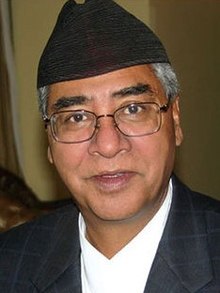Sher Bahadur Deuba
Sher Bahadur Deuba ( Nepali शेरबहादुर देउवा ; born June 13, 1946 in Ruwa Khola Ashigram-5, Dadeldhura District ) is a Nepalese politician . He was Prime Minister of Nepal four times, most recently from June 2017 to February 2018.
biography
Deuba began to be politically active at an early age and was imprisoned for a total of nine years between 1966 and 1985 for his political activities. In 1970 he co-founded the Nepal Students Union, the association of students within the Nepalese Congress Party (NCP) . He played an important role in calling for a democratic, multi-party system in Nepal during the 1980 nationwide referendum .
In the 1991 general election he was elected as a candidate for the NCP for the first time as a member of the House of Representatives and was appointed Minister of the Interior by Prime Minister Girija Prasad Koirala on May 26, 1991 in his cabinet, which was in office until November 30, 1994. After the elections in November 1994, he was elected group leader of the NCP in the House of Representatives. Deuba, one of the leading younger politicians of the NCP, succeeded in this position in the formation of a parliamentary coalition of the NCP with the Rashtriya Prajatantra Party (RPP) and the Nepal Sadbhavana Party (NSP).
This coalition was able to replace the first communist government of the Communist Party of Nepal-United Marxists-Leninists (KPN-VML) led by Prime Minister Man Mohan Adhikari on September 12, 1995 by a vote of no confidence with 107 to 88 votes , so that Deuba himself for the first time on the same day Became prime minister. On March 12, 1997, he resigned following a vote of no confidence on allegations of corruption within the government. In addition, the RPP of the NCP was too much of a dominance of the government coalition.
On July 26, 2001, he succeeded GP Koirala again as Prime Minister and also took over the post of Foreign Minister. On May 22nd, 2002 the parliament was dissolved and Deuba asked to postpone the elections by one year. The reason for this was that the Communist Party of Nepal-Maoist (KPN-M) had been in a civil war against the monarchy and the Hindu class system since 1996 . The insurgents were branded as terrorists after September 11, 2001 . More people died in the internal political conflict within the next six months than in the previous six years. King Gyanendra refused to hold new elections and dismissed Deuba on October 4, 2002 for "incompetence" and on October 11, 2002 appointed a government of his choosing under Lokendra Bahadur Chand .
In April 2004 he was arrested again for violating King Gyanendra's ban on political assembly . However, on June 3, 2004, the king reappointed him prime minister due to demands for a return to democracy. He also took over the office of foreign minister again. On February 1, 2005, he was released and placed under house arrest.
After a release on March 11, 2005, after being arrested again in April, he was sentenced to 2 years imprisonment by the Royal Commission for Corruption Control in July 2005. He was released on February 13, 2006 after the Supreme Court dissolved the commission.
After Prime Minister Pushpa Kamal Dahal resigned on May 24, 2017, as agreed in 2016, Sher Bahadur Deuba was elected Prime Minister by the Nepalese parliament on June 6, 2017. He resigned from this office on February 15, 2018.
Web links
Individual evidence
- ^ Change of government in Nepal. Maoists overthrow communists. In: taz.de. July 25, 2016. Retrieved June 30, 2017 .
- ↑ Nepal's Deuba makes first cabinet picks to guide elections. Reuters, June 7, 2017, accessed June 30, 2017 .
- ↑ Marx is sworn in as the new Prime Minister in Nepal. In: The Standard . February 15, 2018, accessed February 15, 2018 .
| personal data | |
|---|---|
| SURNAME | Deuba, Sher Bahadur |
| BRIEF DESCRIPTION | Nepalese politician, Prime Minister of Nepal |
| DATE OF BIRTH | June 13, 1946 |
| PLACE OF BIRTH | Ruwa Khola Ashigram-5, Dadeldhura District , Mahalkali Zone , Far West Region ( Sudurpashchim Province ) |

